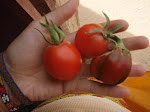
A word about our chief:
Every village has a traditional chief, and the larger villages have multiple ones for their different neighborhoods. Being chief ("Hakimi" or "Maigari" in Hausa), is a responsibility usually passed down between men in a family- from father to son, or brother to brother. I think that the job of the Hakimi may vary to some degree depending on the village, but in general he serves as an important representative of the village to local and regional government officials, settles village disputes, and is almost always around for people to ask questions and get advice.
Every village has a traditional chief, and the larger villages have multiple ones for their different neighborhoods. Being chief ("Hakimi" or "Maigari" in Hausa), is a responsibility usually passed down between men in a family- from father to son, or brother to brother. I think that the job of the Hakimi may vary to some degree depending on the village, but in general he serves as an important representative of the village to local and regional government officials, settles village disputes, and is almost always around for people to ask questions and get advice.
Our Hakimi's name is Mohammed, but we all call him Hakimi. He's a quiet, friendly, soft-spoken older man who really doesn't stick his nose in any body's business but always seems to be in the know. He doesn't talk alot, but he's always sitting out in the shade near our mosque in his white boubou. Often there's a little girl playing on the mat next to him- I think she's his granddaughter, but could possibly be his daughter. When I first got here that's how I knew who he was- by the little girl hiding behind his knees- because I couldn't keep track of everybody by face yet.
I visit the Hakimi every day and exchange greetings, and I keep him informed of any work that I have going on. It would be considered unacceptable to do anything- a meeting, a project- without his knowing. He's been helpful to me in planning village meetings by telling me when and where I'll get the most people, who I should tell, what I should make sure to say. I also give him a few days of heads up before I travel or have visitors, so he always knows where I am. When I do get visitors, one of the first things I do is take them to the Hakimi so he can meet them; such visitors unfailingly comment on how twinkly his eyes are. It's true!
The Hakimi farms just like everybody else, despite his age and relative frailty. People are constantly bugging him during farming season to 'go home and rest!!' but he doesn't really listen. He and his wife live in a small hut and as far as I know don't receive any special privileges for his position. After the yearly harvest, you can find the Hakimi weaving large, thick mats out of straw, which are used for making walls and roofs for shade. He is the only one in our village who knows how to do this work. It's beautiful to watch.










3 comments:
Thank you for sharing this, and for coming over to my blog! I would hope to keep up with your blog as well...wow an artisan of old showing his craft...I am jealous that we do not still practice such simplicity in our country as much, well some do, but practicality is no revered as much...as it should be...
Just awesome. I am with ChefE. We need more simplicity in our country. And we need more craftspeople. Whatever happened to pride in making something with your own hands?
I wonder if the twinkle in Hakimi's eyes is planted there by a young lady who visits him everyday.
Post a Comment